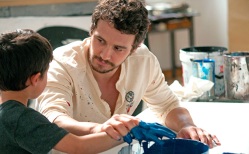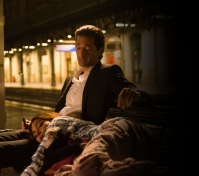Giant Little Ones is post-gay, mid-spectrum, pro-fluid. It’s a very specific adolescence, and except for a few details, it could be mine or yours.
Franky (Josh Wiggins) is on the swim team at school – the kind of swim team who showers together, shaves together, slings homophobic slurs together, apparently without irony. Franky’s best friend Nic is on the swim team too. They do almost everything together, but for Franky’s 17th birthday he’s planning something without him – the loss of his virginity, to his girlfriend, who is nice enough and pretty enough but just not that interesting. Is that a problem? Nic is emphatic: no. Nic and his girlfriend do it 6 times a day!
Franky’s mom (Maria Bello) leaves the house unattended for the party but things don’t go exactly as planned, and at the end of the night it’s just Franky and Nic, like the sleepovers of their childhood. Except this one ends in a blow job. In the morning, Franky is surprised by this turn of events, but Nic is many more things: ashamed, upset, angry. Nic destroys their friendship, and Franky’s reputation, and makes Franky’s life at school hell. The only person who doesn’t desert him is Nic’s sister, Natasha.
I really love Franky’s openness to this experience. Josh Wiggins is a big part of this: he is  charming and sweet, handsome and approachable. Franky doesn’t question his identity, he just absorbs it as part of it. It doesn’t need a label or a judgement. But there is a complication: Franky’s father (Kyle MacLachlan) has recently left the family because he’s gay. Franky’s resentment is mostly due to the abandonment and not the sexuality, but his feelings are complicated and confused and it makes dealing with this just a little harder than it has to be.
charming and sweet, handsome and approachable. Franky doesn’t question his identity, he just absorbs it as part of it. It doesn’t need a label or a judgement. But there is a complication: Franky’s father (Kyle MacLachlan) has recently left the family because he’s gay. Franky’s resentment is mostly due to the abandonment and not the sexuality, but his feelings are complicated and confused and it makes dealing with this just a little harder than it has to be.
Every generation has its own set of unique problems and we’re still uncovering and discovering what it means to be young right now. High school is as hard as ever, but it’s fascinating to be able to peek in through the window to see today’s particulars. I saw Giant Little Ones on a whim and an inkling and it ended up being a really nice find, which is a happy festival occurrence. We go in with such high expectations for the Oscar hopefuls and at best all they can do is meet them. But a little Canadian indie like this can genuinely catch you off guard, and in reinvigorates you when you’re on movie #32 of the festival.

 Year Old Virgin, and the fact that Jane Lynch is in both is just a painful reminder that this subject actually CAN be funny, should be funny, and in fact probably took a lot of effort to screw up this badly. How much effort, you ask? Well, by my count: there are 2 credited with “story by” and FIVE credited with screenwriting. Five! All dudes, naturally. Dudes who like visual jokes about morning wood and sneaky semen. And that doesn’t even count the guy who wrote the book, you know, the REAL guy that this actually happened to.
Year Old Virgin, and the fact that Jane Lynch is in both is just a painful reminder that this subject actually CAN be funny, should be funny, and in fact probably took a lot of effort to screw up this badly. How much effort, you ask? Well, by my count: there are 2 credited with “story by” and FIVE credited with screenwriting. Five! All dudes, naturally. Dudes who like visual jokes about morning wood and sneaky semen. And that doesn’t even count the guy who wrote the book, you know, the REAL guy that this actually happened to. Liam Neeson is a writer doing writerly things in Paris, estranged from his wife (Kim Basinger) after a family tragedy, and making up for lost time with his damaged young mistress (Olivia Wilde).
Liam Neeson is a writer doing writerly things in Paris, estranged from his wife (Kim Basinger) after a family tragedy, and making up for lost time with his damaged young mistress (Olivia Wilde). weird triangle with an awkward “third person”? Or something a little more…literary? I found this flick on Netflix and wondered how such a monstrously recognizable cast had flown under the radar.
weird triangle with an awkward “third person”? Or something a little more…literary? I found this flick on Netflix and wondered how such a monstrously recognizable cast had flown under the radar. ask your partner “Okay, what?” Haggis’s gimmick overwhelms the movie, and the cracking chemistry between stars just isn’t enough to make up for it.
ask your partner “Okay, what?” Haggis’s gimmick overwhelms the movie, and the cracking chemistry between stars just isn’t enough to make up for it. education, the ability to visit over 40 countries while still in his teens, and loads of opportunity. He sprinkled his good fortune with charitable acts for others. But in the movie we don’t see a lot of Dan Eldon, activist. Rather we see Dan Eldon, purveyor of white privilege, with a side of white saviour to further sour the milk.
education, the ability to visit over 40 countries while still in his teens, and loads of opportunity. He sprinkled his good fortune with charitable acts for others. But in the movie we don’t see a lot of Dan Eldon, activist. Rather we see Dan Eldon, purveyor of white privilege, with a side of white saviour to further sour the milk.